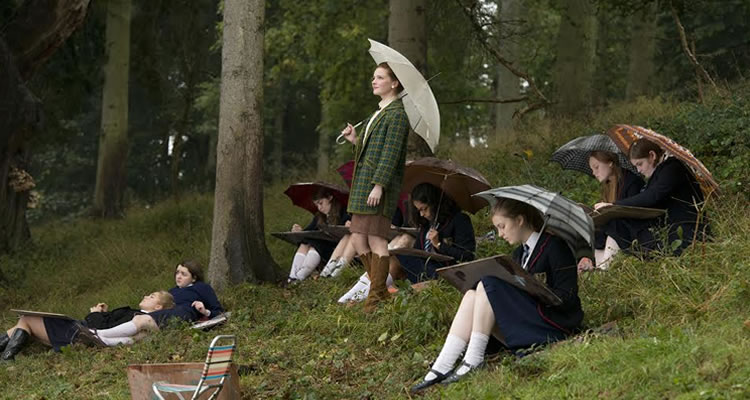From Beatlemania to simple peer pressure, the bizarre phenomenon of mass hysteria fuels Carol Morley’s sumptuous and seductive drama THE FALLING.
Following up the critically-acclaimed docudrama DREAMS OF A LIFE (2011), writer/director Carol Morley once again follows Alice down another true-life rabbit-hole in THE FALLING.
Set in an all-girls school in England, 1969, Morley uses this tale of sexual awakening to examine the psychogenic illness that is mass hysteria, where perplexing symptoms such as fainting, nausea, severe headaches and convulsions can suddenly sweep through a group of young girls.
Maisie Williams (GAME OF THRONES, GOLD) and newcomer Florence Pugh are the best friends who find themselves succumbing to this mystery illness just as they try to come to terms with their burgeoning sexuality, and the thrilling sense of free love that prevailed at the time.
THE FALLING is really a continuation of one of your shorts, 2006’s THE MADNESS OF THE DANCE – was it always the intention to examine this mystery illness in a feature?
Carol Morley: When I found out this psychogenic illness, this mass hysteria, I made a short film with Cairo Cannon, my producer, but I knew pretty much from the start that there was a feature here. Especially when I met Simon Wessely, president of the Royal College of Psychiatrists at King’s College, London. I remember coming out of his office and thinking about evolving this idea into a feature. That was ten years ago…
There were cases of mass hysteria that fascinated you – most recently, 240 pre-teen and teenage girls in El Carmen de Bolivar, northern Colombia, hospitalised due to shortness of breath, headaches, nausea nad fainting spells – so, how did you come to settle on an English all-girls boarding school in 1969 for THE FALLING?
CM: One of the main reasons was I wanted to have a bunch of girls without mobile phones constantly in their hands, and, given that mass hysteria are often connected to anxieties of the time, I thought 1969 would be a rich backdrop. Now, the mass hysteria is connected to terrorism, or chemicals, stuff like that, but, in 1969, it was really the sexual revolution that was causing all the confusion. Even though it wasn’t touching everybody, everywhere, the free love movement was in the air.
It’s all Mick Jagger’s fault.
CM: Absolutely. Also, I liked the irony of the mum of the house not being able to leave the house just as man lands on the moon.
Were there certain cinematic reference points for you, and for your actors? Shades here of PICNIC AT HANGING ROCK, THE VIRGIN SUICIDES, SWEETIE, HEAVENLY CREATURES…
CM: Not for the actors, because you really want to create their world with them, rather than impose a world upon them. So, I would never give them any references. Or watch the monitors either – I wanted them to feel that it was their world. I just gave them music as a reference point, to tap into the mood of the time. For me though, there were movies that inspired the film – PICNIC AT HANGING ROCK, DON’T LOOK NOW, SWEETIE. All the ones you’ve mentioned, really.
So, you have one of the most opinionated brothers on the planet in music critic Paul Morley – a hindrance or a help when it came to becoming an artist?
CM: I think the opinionated thing has never been directed towards my work, which is probably a good thing. But, growing up in Stockport, it was quite inspirational to think of my brother in London meeting all these great artists. It made you realise that the world of magic was within reach for everyone.Having said that, I never knew that I wanted to make films. It wasn’t until I was 23, and started to wonder about what I should do with my life, that I saw this part-time course for photo-video. So, I kept up my day job in a shop, and did this course at night, still not entirely sure about what I was going to do. It just took one great inspirational teacher to send me on my way, and then I signed up to do fine art film at St. Martin’s – where I met more inspirational teachers, who had me explore film deeper and deeper. All by default then…
Is commercial success important to you?
CM: I do think a film doesn’t really exist until an audience see it, but, at the same time, I would never want to make a film that I approached largely as something that would sell.
THE FALLING is released in Irish cinemas on April 24th.
Words: Paul Byrne


